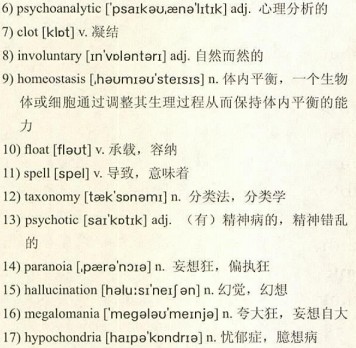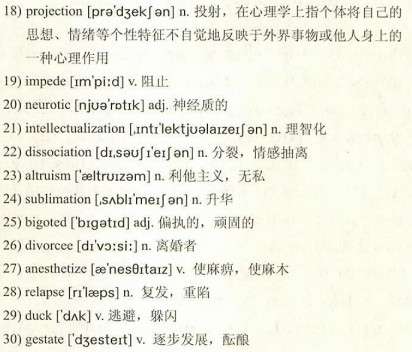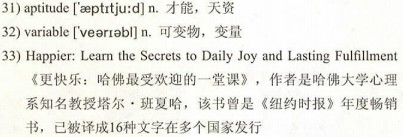Last fall I spent about a month in the file room of the Harvard Study of Adult Development, hoping to learn the secrets of the good life. The project is one of the longest-running—and probably the most 1)exhaustive—2)longitudinal studies of mental and physical well-being in history. Begun in 1937 as a study of healthy, well-adjusted Harvard sophomores (all male), it has followed its subjects for more than 70 years.
 去年秋天,我花了大概一个月的时间埋首于名为“成人发展”的哈佛研究项目(编者注:包含两批研究对象,其中一批对象参与的是下文提到的Grant Study,即“格兰特研究”)的资料室里,希望能够了解到美好人生的秘诀。这一项目是史上持续时间最长——也许还是最详尽的——有关人们心理和身体健康的纵向研究之一。它开始于1937年,以身心健康、大方融入社群的哈佛大学二年级学生(全部为男性)为研究对象,追踪研究时间超过70年。
去年秋天,我花了大概一个月的时间埋首于名为“成人发展”的哈佛研究项目(编者注:包含两批研究对象,其中一批对象参与的是下文提到的Grant Study,即“格兰特研究”)的资料室里,希望能够了解到美好人生的秘诀。这一项目是史上持续时间最长——也许还是最详尽的——有关人们心理和身体健康的纵向研究之一。它开始于1937年,以身心健康、大方融入社群的哈佛大学二年级学生(全部为男性)为研究对象,追踪研究时间超过70年。
From their days in Harvard to their 3)active duty in World War II, through marriages and divorces, professional advancement and collapse—and now well into retirement—the men have submitted to regular medical exams, taken psychological tests, returned questionnaires, and sat for interviews. The files holding the data are as thick as 4)unabridged dictionaries. For 42 years, the 5)psychiatrist George Vaillant has been the chief curator of these lives, the chief investigator of their experiences, and the chief analyst of their lessons. The central question that Vaillant has focused on is not how much or how little trouble these men have met, but rather precisely how—and to what effect—they have responded to that trouble. His main interpretive lens has been the 6)psychoanalytic metaphor of “adaptations (also called “defense mechanisms”),” or unconscious responses to pain, conflict, or uncertainty. Vaillant explains defenses as the mental equivalent of a basic biological process. When we cut ourselves, for example, our blood 7)clots—a swift and 8)involuntary response that maintains 9)homeostasis. Similarly, when we encounter a challenge large or small—a mother’s death or a broken shoelace—our defenses 10)float us through the emotional swamp. And just as clotting can save us from bleeding to death, defenses can 11)spell our redemption or ruin.
从在哈佛读大学、参加二战服兵役、结婚、离婚、事业升迁或失败,到如今退休,这些学生定期接受医学检查、进行心理测试、回答调查问卷,还亲身接受访谈。收录着这些数据的文档如同未经删节的字典一样厚。过去42年来,精神病专家乔治·韦兰特一直是这段段人生的资料主管,也是负责调查记录他们的人生经历并进行分析的首席研究员。韦兰特聚焦的核心问题不是其研究对象遭遇人生磨难的多寡,而恰恰是他们如何去应对那些困难及其相应的效果。他主要关注的是“适应性”(又被称为“防御机制”)在心理分析层面的隐喻,或者说,是人对痛苦、冲突和无常这种种状况的无意识反应。韦兰特解释说,“防御”是一种与我们基本的生理反应相当的心理过程。就好比,当我们割伤了自己时,我们的血液会凝结——一种快速且自然而然的生理反应以维持体内平衡。类似地,当我们遭遇大小的挑战——母亲去世或鞋带断 掉——我们的“防御机制”会承载我们穿过情绪的沼泽。正如凝血功能可以让我们免于流血而死,是自我救赎,还是自我毁灭,这全看我们的“防御机制”。
Vaillant’s 12)taxonomy ranks defenses from worst to best, in four categories. At the bottom of the pile are the unhealthiest, or “13)psychotic,” adaptations—like 14)paranoia, 15)hallucination, or 16)megalomania—which, while they can serve to make reality tolerable for the person employing them, seem crazy to anyone else. One level up are the “immature” adaptations, which include passive aggression, 17)hypochondria,18)projection, and fantasy. These aren’t as isolating as psychotic adaptations, but they 19)impede intimacy. “20)Neurotic” defenses are common in “normal” people. These include 21)intellectualization, 22)dissociation, and repression. The healthiest, or “mature,” adaptations include 23)altruism, humor, anticipation, and 24)sublimation (finding outlets for feelings, like putting aggression into sport).
韦兰特把“防御机制”按最糟到最好的顺序分成了四类。最底层的是最不健康的,或者说是“精神处于病态的”适应,比如偏执疑心、幻觉重重、狂妄自大,对于动用这些防御的主体,也许可以让现实变得更能容忍,但在其他人看来却很疯狂。第二层是“不成熟的”适应,具体表现包括消极攻击、忧郁症、投射和想入非非。这些虽然不像病态适应那样让人孤立,但也会让人感到无法亲近。“神经质的”防御在“正常”人中并不罕见,它包括理智化、情感抽离和压抑。最健康的,或者说“成熟的”的适应包括无私、幽默、心理期待和升华(为情感找到宣泄口,比如把攻击性用到体育运动中)。
Vaillant sees adaptations as arising from the pain of experience and playing out through the whole lifespan. Take two Grant Study men, whom were named “David” and “Carlton”, for example. Both men grew up fearful and lonely. David was raised in a blue-collar family, had a 25)bigoted, alcoholic father, and a mother he described as “very nervous, irritable, anxious.” Carlton was richer, and was raised in a wealthy suburb, but he also had an alcoholic father, and his mother was so depressed that he feared she would commit suicide. David went on to become a national leader on civil-rights issues—a master, Vaillant argued, of the “mature” defenses of sublimation and altruism. However, Carlton, once a doctor, then left a regular practice to work for the state; a three-time 26)divorcee who 27)anesthetized his pain with alcohol and sedatives. Carlton was, Vaillant said, a user of “neurotic” and “immature” defenses. After a 28)relapse into drug abuse, Carlton killed himself at 53. David lived to 70. This also means that a glimpse of any one moment in a life can be deeply misleading. A man at 20 who appears the model of altruism may turn out to be a kind of emotional prodigy—or he may be29)ducking the kind of engagement with reality that his peers are both moving toward and defending against. And, on the other extreme, a man at 20 who appears impossibly wounded may turn out to be 30)gestating toward maturity.
韦兰特认为“适应”源于个人的痛苦经历,且会作用于人的一生。以格兰特研究中的两名男子为例,他们分别叫“大卫”和“查尔顿”。两个人都在孤独和恐惧中长大。大卫生长在一个蓝领阶级家庭,有一个刚愎自用的酒鬼父亲,母亲,如他所形容的,“非常紧张、易怒且焦躁不安”。查尔顿的家庭则比较富裕,住在条件优越的郊区,但他同样有个嗜酒如命的父亲,他的母亲终日郁郁寡欢,他真怕她会自杀。大卫后来成为一位国内民权运动领袖。韦兰特认为他乐于助人且擅长寻找情绪宣泄的途径,是“成熟的”适应的典范。然而,曾是一名医生的查尔顿后来不再行医而是进入政府部门工作,经历过三次离婚,习惯以酒精和镇静剂来麻痹自己的痛苦。韦兰特说,查尔顿采用的是“神经质的”和“不成熟的”“防御机制”。在再次陷入滥用药物的境地之后,查尔顿在53岁时结束了自己的生命。而大卫活到了70岁。这也意味着,单单窥探人生中的某一个时刻或片段往往会造成误导。一个人20岁时看似是个“无私”的典范,他或许会变成一个情感方面的天才,也可能他只是比同辈们更擅长逃避现实而已。另一方面,20岁时看似极度受伤的人,也许正在大步朝成熟迈进。
What allows people to work and love as they grow old? By the time the Grant Study men had entered retirement, Vaillant, who had then been following them for a quarter century, had identified seven major factors that predict healthy aging, both physically and psychologically. Employing mature adaptations was one. The others were education, stable marriage, not smoking, not abusing alcohol, some exercise, and healthy weight. Of the 106 Harvard men who had five or six of these factors in their favor at age 50, half ended up at 80 as what Vaillant called “happy-well” and only 7.5 percent as “sad-sick.” Meanwhile, of the men who had three or fewer of the health factors at age 50, none ended up “happy-well” at 80.
随着人们渐渐老去,是什么让他们能继续工作,继续去爱?当格兰特研究的对象们纷纷退休,韦兰特已经追踪研究他们有25年了,至此,他已经找到了可预测人们健康老去(包括身体和心理两个方面)的七个主要因素。采用成熟的心理防御机制是一大因素,其他因素则包括:教育、稳定的婚姻、不吸烟、不酗酒、适当运动和健康的体重。在106名哈佛研究对象中,50岁时,符合上述5至6个因素的人之中有一半在80岁时过得“健康而快乐”,只有7.5%的人过得“悲惨而病弱”。与此同时,50岁时,上述因素中只满足3个或更少的,到80岁时,无一人过得“健康快乐”。
Vaillant’s other main interest was the power of relationships. “It is social 31)aptitude,” he writes, “not intellectual brilliance or parental social class that leads to successful aging.” Warm connections are necessary—and if not found in a mother or father they can come from siblings, friends, or mentors. The men’s relationships at age 47, he found, predicted late-life adjustment better than any other 32)variable, except defenses. Good sibling relationships seem especially powerful: 93 percent of the men who were thriving at age 65 had been close to a brother or sister when younger. In an interview in the March 2008 newsletter to the Grant Study subjects, Vaillant was asked, “What have you learned from the Grant Study men?” Vaillant’s response: “That the only thing that really matters in life is your relationships to other people.”
韦兰特的另一个主要兴趣是人际关系的力量。“社交能力”,他写道,“比智力才华或父母的社会地位更能决定老年的幸福。”让人感到温暖的人际关系是必需的——如果得不到父母的关爱,那么还可以从兄弟姐妹、朋友、导师等那里获得关爱。韦兰特发现,除了看“防御机制”,一个男人在47岁时的人际关系比其他任何变量更能预见其未来的生活是否幸福。良好的兄弟姐妹关系的作用似乎特别强大:65岁时生活健康幸福的男人中93%有一个关系密切的姐妹或兄弟。2008年3月发给格兰特研究对象的通讯快报的访谈报道中,韦兰特被问到,“你从格兰特研究的对象们身上学到了什么?”他的回答是:“人生中真正重要的事情是你和他人的关系。”
The bookstore shelves are lined with titles about “happiness”, such as 33)Happier: Learn the Secrets to Daily Joy and Lasting Fulfillment and 34)The How of Happiness. But what does it mean, really, to be happier? Of course, happiness scientists have come up with all kinds of straightforward and actionable findings: That money does little to make us happier once our basic needs are met; that marriage and faith lead to happiness (or it could be that happy people are more likely to be married and spiritual); that35)temperamental “36)set points” for happiness—a 37)predisposition to stay at a certain level of happiness—account for a large, but not overwhelming, percentage of our well-being. Perhaps, I thought, the key to the good life lies not in rules to follow, nor problems to avoid, but in an engaged humility, an earnest acceptance of life’s pains and promises.
书店货架上摆放着各种各样有关“幸福”的书籍,例如《更快乐:哈佛最受欢迎的一堂课》和《快乐之道》。但是,生活得更幸福到底指的是什么?当然,研究幸福的科学家们得出了各种各样简单而可操作的结论:当基本需求得到满足时,金钱并不能让我们更快乐;婚姻和信仰可让人更快乐(也可能是快乐的人更容易步入婚姻的殿堂和有精神信仰);那些脾性方面的快乐“基点”——使一个人的快乐感维持在某个程度的癖性——在很大程度上(但并非绝对)决定我们幸福与否。而在我看来,或许美好生活的“关键”并不在于遵循某种标准,也不在于避免各种问题,而在于抱持一种谦卑而认真的态度去面对人生的痛苦与希望。






